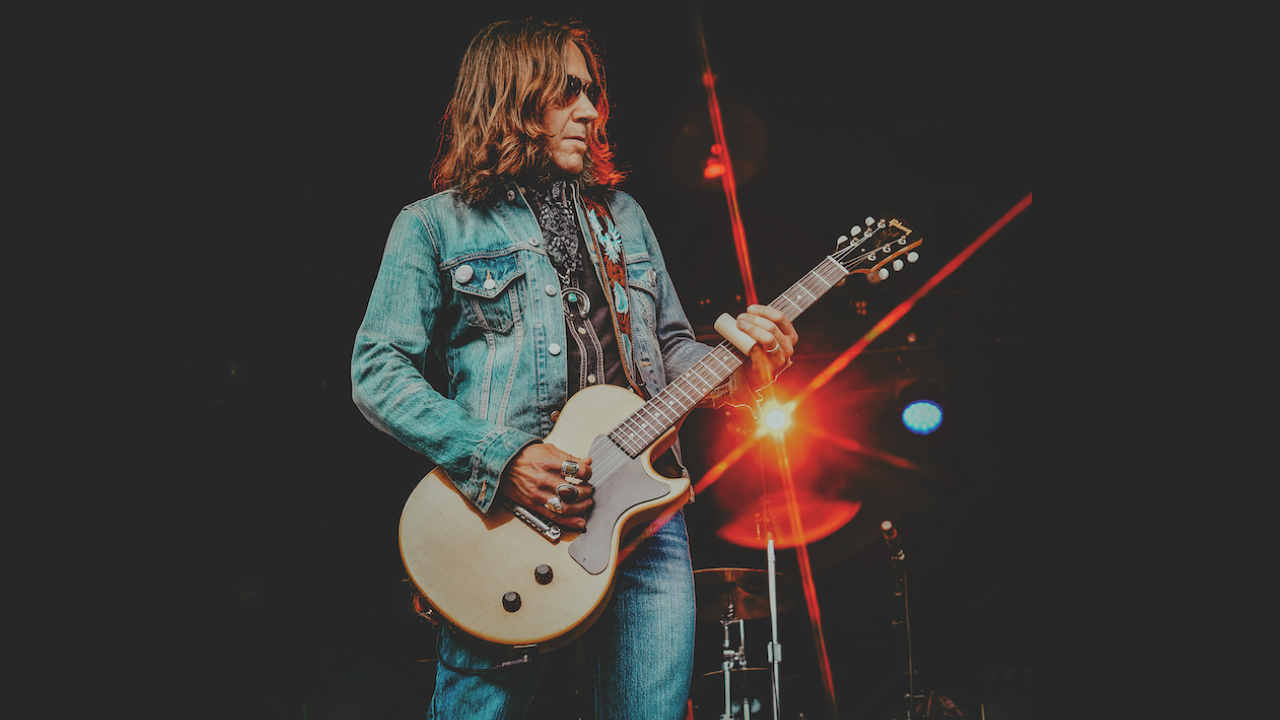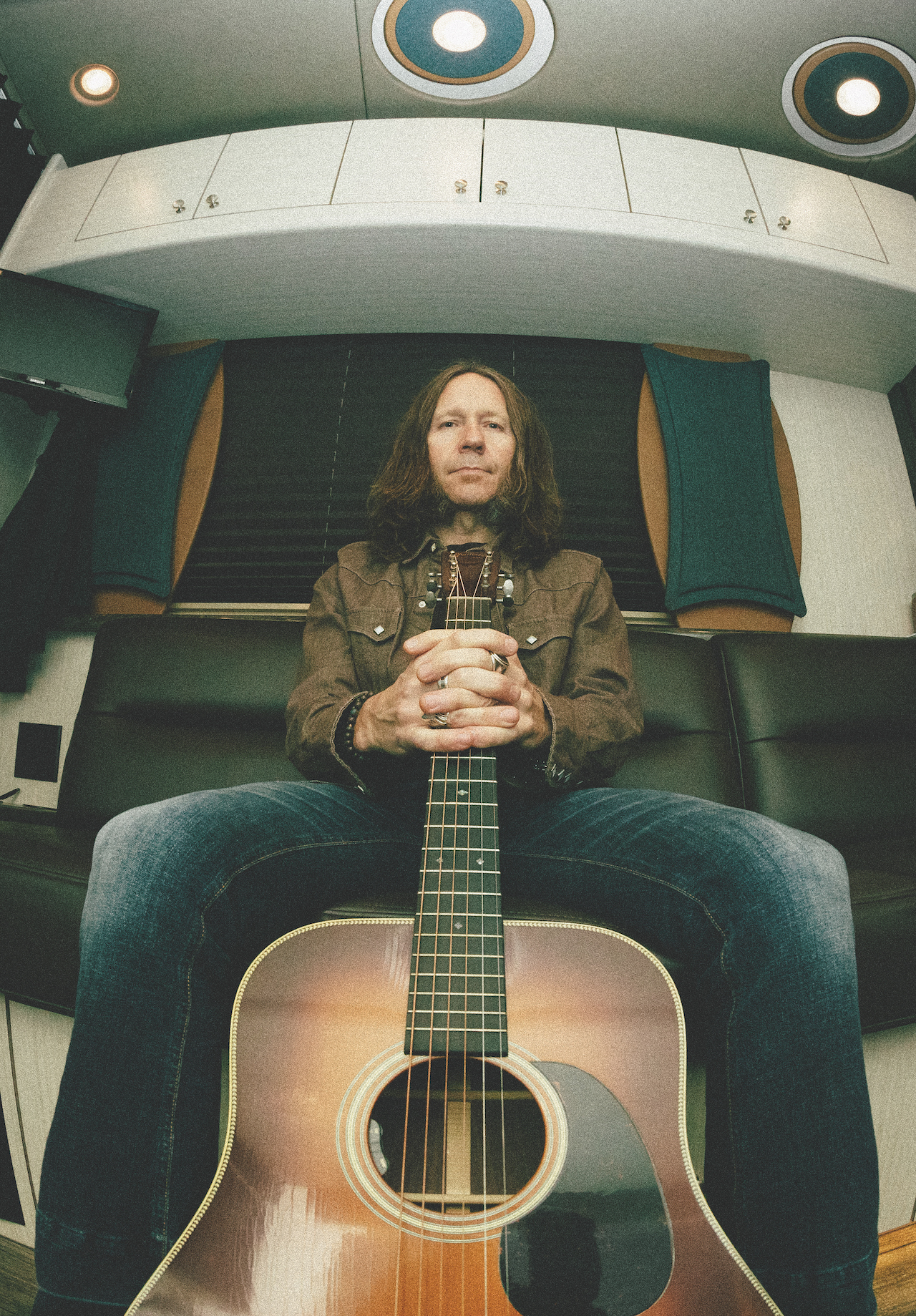“Dave Cobb had just done the last Slash record with walls of Marshall stacks, which got ungodly loud – I don’t think we used anything bigger than an 8” speaker!” Blackberry Smoke’s Charlie Starr on why downsizing his backline made for bigger tones
Blackberry Smoke’s frontman, guitarist and compulsive gearhead explains why using little amps “creates a whole different experience”

It was all set up to be a great year for Blackberry Smoke, with the release of a fine new album, Be Right Here. But just a few days after guitarist and vocalist Charlie Starr spoke to Total Guitar about the making of the album, it was announced that the band’s drummer and co-founder Brit Turner had died on March 3 at the age of 57.
In this interview, Charlie explained how they had set out to make an intimate-sounding record. Producer Dave Cobb came into the project having just worked on the Slash featuring Myles Kennedy and the Conspirators album 4 – live-recorded with loud Marshall stacks.
But with Blackberry Smoke, Cobb encouraged the band to use tiny amps so they could get in tight amongst one another in the room. Now, there is poignancy in how Charlie described the sessions: “During recording I was sitting right across from Brit’s drums…”
Be Right Here is an album which delicately blends the drawl of Southern rock with soulful blues and classic rock. It now stands as a fitting epitaph for Brit Turner.
How would you describe Be Right Here in a few short sentences?
“It feels really warm and natural to me. It feels like I am literally in the room when I hear it. I’m sitting in that spot across the across from the drums where I was during recording. Organic is a word that’s used so much, but it really is a very organic sounding record. It doesn’t sound rushed at all – we were very relaxed making it and it makes me very happy to listen to it.”

Has your approach changed at all when it comes to writing a new Blackberry Smoke album?
Get The Pick Newsletter
All the latest guitar news, interviews, lessons, reviews, deals and more, direct to your inbox!
“I never want to repeat myself or write anything derivative and I think that Dave [Cobb] was thinking the same thing – we’re not going to go in and do exactly the same thing as last time. An important thing he said before recording was, ‘Don’t bring any big amps – let’s use Fender Champs and Princetons.’
“I bought a little Gibson GA-5T with tremolo and I don’t think we used anything bigger than an 8” speaker so that we would all be in the room with the gear. He’d just done the last Slash record with walls of Marshall stacks, which he said got ungodly loud, so this was a little different. We used Gobos [acoustic isolation panels] and didn’t worry too much about bleed.”
Did this make the recording process a lot more comfortable, being able to vibe off one another?
“It actually achieved the exact opposite of what I thought would happen. I thought that everybody was going to be apprehensive and think, ‘Well, I better not fuck up, because if I do, I’m ruining the take.’ But instead it all just kind of glued itself together.
“We felt like one cohesive unit. It made the playing more human. There were a couple of times where I went into a vocal booth with an acoustic guitar, but I wanted to be back in the room with the other guys. It felt like making a ’60s record.”
Was everything recorded in single takes?
“We didn’t play any solos on the floor. We hadn’t rehearsed a ton, and a bad solo could ruin the take. We actually recorded lead guitars in Savannah and we used those same little amps. Dave said, ‘Don’t bring a Marshall stack!’ I wound up using this little 1964 Fender Champ which was sitting in a hearth, and it sounded magical.
“I love those little tweed amps. They have so much natural compression and they’re really touch-sensitive. You can hear the speaker cone; it’s like I’m rubbing that paper between my fingers. You’re not getting the heft and the air of something like a Marshall Super Lead, but it creates a whole different experience.”
Which guitars are your most trusted tools?
“There’s a Gibson ES-330 that I have, which is a hollowbody with a P-90 pickup. It’s early ’65 and I’ve used it on every record since [2012’s] The Whippoorwill. It just records really, really well. So I always take that, and my little black ’56 Les Paul Jr. That’s the only two that I have to take into the studio with me. And I don’t always use the little black Jr. – I might use a different guitar.
“It depends on how they sound through a specific amplifier for that specific song. And that happens a lot. There’s a song on the record called Like It Was Yesterday, and I really wanted to play this one specific Telecaster on it because I was identifying that guitar with that song. I played it and it sounded good.
“Then, just to see, I picked my ’63 Esquire up and it sounded so much better. It had so much more body and bite and I was like, ‘Well, this one wins – I was wrong!’”
So how many different guitars feature on the new album?
“Not as many I thought! I wound up playing a 1964 Gibson ES-335 on a lot of songs, as well as a 1957 Les Paul Jr. and the Esquire. That’s about it. I work those guitars through the whole record, and I use a couple of different acoustics, a Martin and a Gibson.”
Did you get to experiment with any new pedals?
Our producer said ‘Don’t bring a Marshall stack!’
“Dave Cobb was using a Menatone Red Snapper from the mid-’90s and I loved it. It’s an overdrive pedal that really has a unique bite and voice to it. I knew I had to have one for myself and Dave said, ‘You better start looking because they have gotten expensive!’ I mean, dammit – why are all these great pedals over a thousand dollars?
“So that pedal was used a lot, and a couple of cool fuzzes and Analog Man pedals like the King of Tone. That’s a great pedal. When I record with something I then have to use it on the road because now it’s attached to that song for me, mentally.”
You put out Stoned, an EP of Rolling Stones covers in 2022. Did that experience teach you anything?
“The Stones are a band that lives on feel, so completely. None of those songs are difficult, technically. It’s not it’s not like learning a Rush song. It’s all about the feel, and that can be difficult.
“You don’t just accidentally play the groove of Tumbling Dice – it’s got a real pocket. Charlie Watts is playing the drums and Bill Wyman is a little bit forward as a bass player and Keith Richards is very behind the beat which causes this wobble that only they have. You can’t teach that.”
Which I guess puts more reason to record in the room together?
“Yeah. We had takes where I felt we got a little swift at the end and Dave would always say, ‘Who cares? We’re humans!’ At one point he got his phone out and played [Stones classic] Honky Tonk Women and he showed us how it kept speeding up, but that’s something that’s never made us want to turn the song off before. So that was our lesson to stop worrying about tempo changes. He won’t allow a click.”
As a huge lover of gear, how do you choose which of your many guitars to take out on the road with you?
“I want to take all of them! But I’ll know which ones I actually do need or what type of pickup configuration I need, because the songs really will dictate that. When I think about a song or a riff, I’ll know that’s a humbucker riff right there, you won’t play that on a single coil, and vice versa.
“So I know I’ll need my Les Paul Jr. for the humbucker songs, and a Telecaster or Esquire for single coil stuff. Sometimes I’ll have just found a guitar and I’ll think, ‘I’ve gotta take this one because it’s gonna sound great.’ So then it starts to be like I’m packing for a beach trip. I just throw it all in there!”
With that in mind, what was the last piece of gear you bought?
“Well, I just got another ’56 Les Paul Jr. back in September. I found a really good deal on that guitar and a 1960 Fender concert. Then a couple of weeks ago, a friend hit me up and said, ‘You got an interest in a mid-’60s Vox?’ And of course I did! It’s a ’65 AC15 twin, and it’s glorious.”
If all your guitars were in a burning building and you only had time to save one, which would it be and why?
“It’d be my little black Gibson Les Paul Jr. that I bought in 1993 or so, and it’s my favourite. We’re attached. We have a bond that I got with it immediately the first time I ever played it. There’s no way to explain it, you know, just it’s a tangible thing.”
- Be Right Here is out now.
A freelance writer with a penchant for music that gets weird, Phil is a regular contributor to Prog, Guitar World, and Total Guitar magazines and is especially keen on shining a light on unknown artists. Outside of the journalism realm, you can find him writing angular riffs in progressive metal band, Prognosis, in which he slings an 8-string Strandberg Boden Original, churning that low string through a variety of tunings. He's also a published author and is currently penning his debut novel which chucks fantasy, mythology and humanity into a great big melting pot.
“I just learned them from the records. I don’t read tabs or anything, I don’t read music – I learned by ear”: How a teenage Muireann Bradley put a cover of Blind Blake’s Police Dog Blues on YouTube and became a standard bearer for country blues
“The Strat was about as ‘out’ as you could get. If you didn’t have a Floyd Rose, it was like, ‘what are you doing?’”: In the eye of the Superstrat hurricane, Yngwie Malmsteen stayed true to the original











